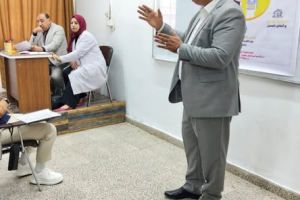
Master’s thesis at Diyala University discusses the impact of the accelerated learning model (Smith) on the acquisition of rhetorical concepts among fifth-grade female students
The Faculty of Basic Education at the University of Diyala discussed a master’s thesis entitled “The Impact of the Accelerated Learning Model (Smith) on the Acquisition of Rhetorical Concepts among Fifth Grade Female Students” in the field of Arabic language teaching methods.
The study, presented by student Nadia Daoud Salman Al-Obeidi, aimed to determine the effect of the Smith Accelerated Learning Model on the acquisition of rhetorical concepts among fifth-grade female students studying literature. To achieve this goal, the researcher formulated the following null hypothesis:
The study reached a number of conclusions, most notably: The effectiveness of the accelerated learning model in teaching and acquiring rhetorical concepts for fifth-grade female students in the literary stream, compared to the traditional method within the limits of the current study. The accelerated learning model helped make the role of the student more effective and active, which increased their motivation to learn rhetoric, as it makes the student the focus of the educational process and the basis for obtaining the required information by encouraging thinking and expanding the rhetorical concept.
The study recommended the need to rely on modern models and strategies, including the accelerated learning model in teaching rhetoric to fifth-grade literature students, and holding training courses for Arabic language teachers to learn about modern models, methods, techniques, and strategies, including the accelerated learning model for use in the classroom.
The study suggested conducting a similar study on other academic levels to assess the impact of the accelerated learning model on concept acquisition, as well as conducting a similar study to assess the impact of the accelerated learning model on female students’ acquisition of other Arabic language skills, such as spelling and expression.


![]()



